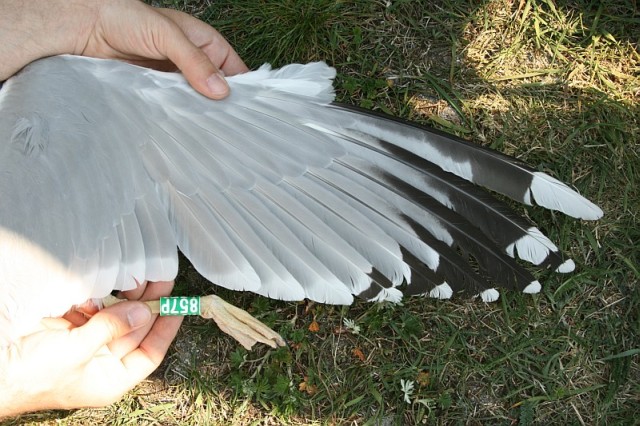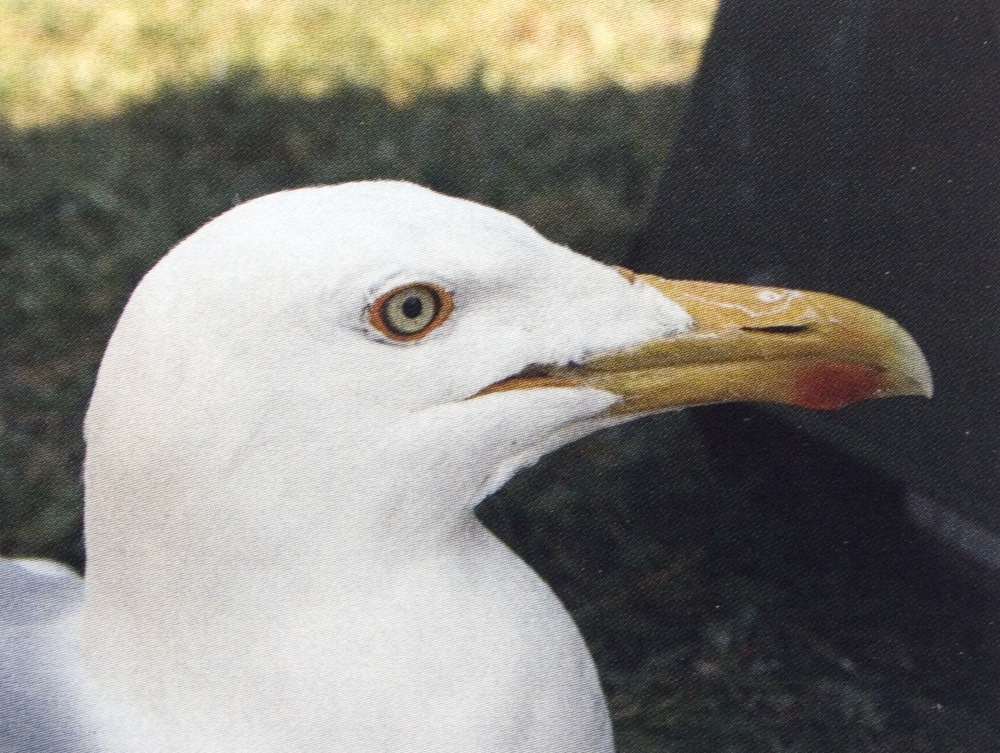 Larus cachinnans
Larus cachinnans
(last update:
Greg Neubauer
Marcin Przymencki
Albert de Jong
Mars Muusse
cachinnans plumages
Larus cachinnans hybrid 7CY male 857P April 29 2009, Włocławek Reservoir, central Poland. Picture: Magdalena Zagalska-Neubauer.
Known male hybrid argentatus (mother) x cachinnans (father), 7CY. April 29 2009, Wloclawek - Vistula river, Poland. Ringed as a chick in Wloclawek on May 22 2003. Note that the wing-tip is very Caspian-like (e.g. fully white tip to P10, more white than black in P10 and a full band across P5). However, it has a non-spotted iris, pale orange eye-ring and intermediate bill proportions; these features count against Caspian. Although hard to judge from this photograph, when computed from in-hand measurements the bill ratio was 2.69, too low for classic Caspian. Its overall score was 11, roughly halfway between the Herring and Caspian distributions, illustrating its intermediate phenotype.


Below, table 1 is repeated to score this bird. All traits can be scored, the scores are in italic + bold. Here, all 9 traits are visible from the image, total score 11.
| Trait | Score | Description |
| P10 overall pattern: white to black ratio | 0 | less black than white |
| 1 | approximately equal black and white | |
| 2 | more black than white | |
| P10: white tip | 0 | clear white, no signs of black |
| 1 | small dark spots on one or both webs | |
| 2 | incomplete subterminal bar (two large black spots, one on each web or an unconnected bar, broken in the middle) | |
| 3 | complete subterminal bar | |
| P10: tongue | 0 | white or whitish |
| 1 | paler than mantle | |
| 2 | same shade as mantle | |
| P5: extent of black | 0 | black on both webs connected, forming band, black of equal depth on each web |
| 1 | black on both webs connected, forming band, black on outer web deeper than inner | |
| 2 | black on both webs, but isolated spots (= incomplete bar) | |
| 3 | black on outer web only | |
| 4 | no black | |
| P4: extent of black | 0 | black on both webs |
| 1 | black on one web only | |
| 2 | no black | |
| Iris peppering | 0 | dark-looking, >50% covered by dark spotting/peppering |
| 1 | moderately dark, with 10-50% of the area spotted | |
| 2 | single or very few dark spots (area < 10%) | |
| 3 | no dark spotting on iris - this score indicated by authors, but obvious spots present. | |
| Eye-ring colour | 0 | dark/deep orange to red |
| 1 | pale to moderately orange | |
| 2 | yellow | |
| Bill shape | 0 | very long and slim, with little/no visible gonydeal angle (L:D ratio >2.8) |
| 1 | slim, slight gonydeal angle (ratio 2.4-2.79) measured 2.69 by authors | |
| 2 | intermediate (ratio 2.0-2.39) | |
| 3 | short and deep, well-marked gonydeal angle (ratio <2.0) | |
| Leg length | 0 | long |
| 1 | moderately long | |
| 2 | short |